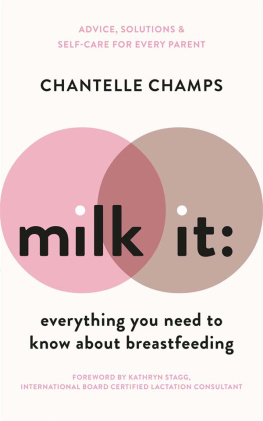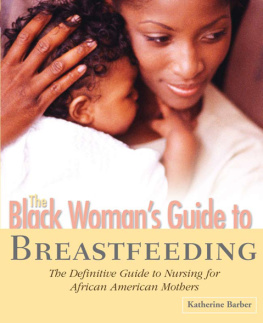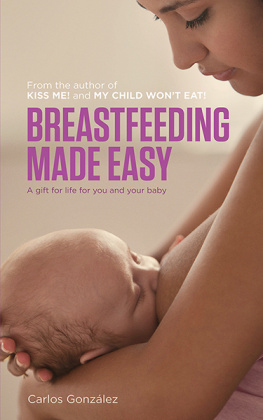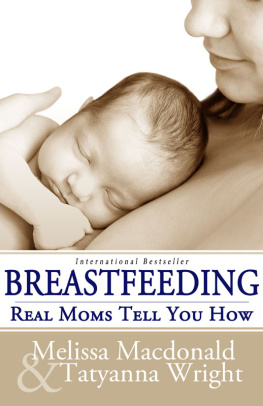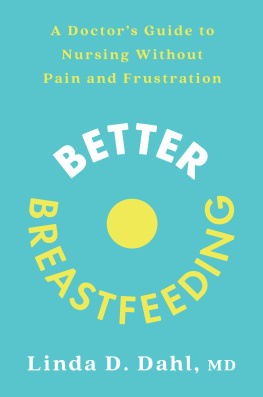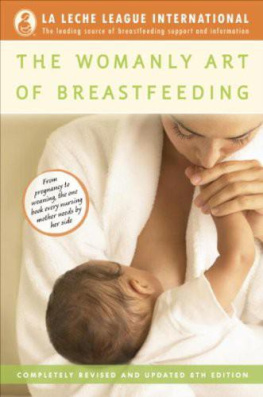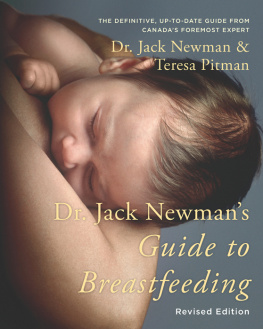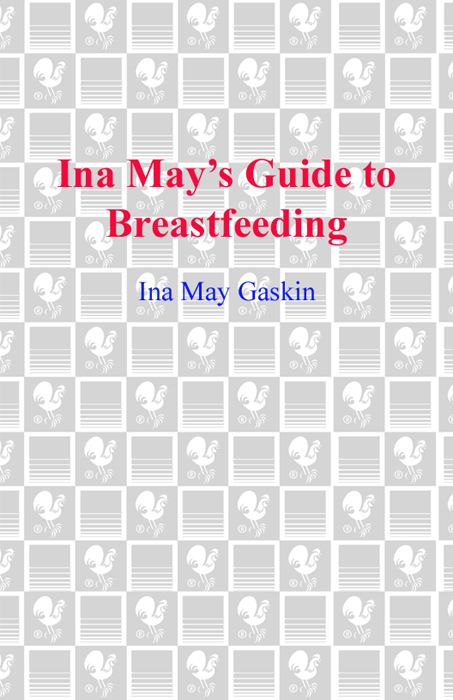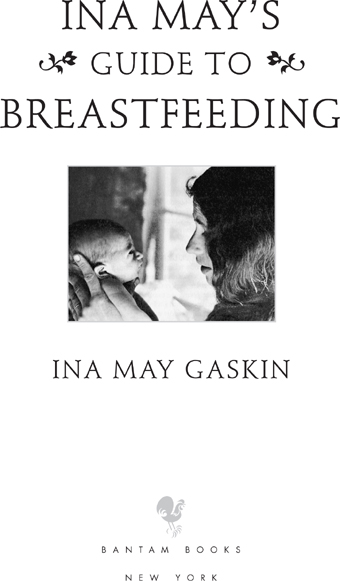A LSO BY I NA M AY G ASKIN
Ina Mays Guide to Childbirth
Spiritual Midwifery
To all those who work to raise the status of
breastfeeding as a gift for future generations
C ONTENTS
16
I NTRODUCTION : B REAST I S B EST
P regnancy can be a time of great wonder and excitement as you prepare for the birth of your baby. One of the great blessings of pregnancy is that your body and nature take complete care of the nourishment of your little one during his time inside your body (as long as you eat well). Who could design a machine that could reproduce and nourish its offspring so beautifully as this? You dont even have to think about how to do it!
One decision that does merit a conscious choice on your part is the first food that will nurture your baby once he is born. Will it continue to come from you or will you buy it from the shelves of a grocery store? Does it matter? You probably wouldnt have picked up this book if you didnt already have some idea of the benefits of breastfeeding and the possible undesirable consequences of feeding artificial milks to babies as a first choice. Even so, you may be surprised to find out how much your decision matters.
Assuming that pediatricians are the accepted medical experts on the needs and health of babies and young children, lets start with what their professional organization has to say on the subject of infant feeding. The American Academy of Pediatrics issued its first policy statement in
Excerpts from the American Academy of Pediatrics
Policy Statement on Breastfeeding
and the Use of Human Milk
Human milk is the preferred feeding for all infants, including premature and sick newborns, with rare exceptions.
When direct breastfeeding is not possible, expressed human milk, fortified when necessary for the premature infant, should be provided.
Breastfeeding should begin as soon as possible after birth, usually within the first hour. Except under special circumstances, the newborn infant should remain with the mother throughout the recovery period. Procedures that may interfere with breastfeeding or traumatize the infant should be avoided or minimized.
Newborns should be nursed whenever they show signs of hunger, such as increased alertness or activity, mouthing, or rooting. Crying is a late indicator of hunger.
Appropriate initiation of breastfeeding is facilitated by continuous rooming-in.
No supplements (water, glucose water, formula, and so forth) should be given to breastfeeding newborns unless a medical indication exists.
Exclusive breastfeeding is ideal nutrition and sufficient to support optimal growth and development for approximately the first six months after birth.
Now lets turn to another health authority, the World Health Organization (WHO). The WHO ranks the safety of milks in the following way: first, the babys mothers milk taken directly by the baby from the mothers breast; second, the babys mothers milk taken from a bottle; third, the milk of another mother; and last, bottle-feeding of artificial milk formulas. Please note that the WHO does not say that artificial milk formulas shouldnt be consumed but that it is better for the baby if they are used only as a last resort.
Here is a very practical reason to begin nursing your baby. When you choose to feed your baby this way, you are preserving your ability to have a choice about your feeding method. You can always stop breastfeeding and switch to artificial feeding later. What is there to lose? On the other hand, if you begin with artificial feeding and then find that your baby is allergic to several different products (which happens sometimes), it can be quite difficult to switch back to breastfeeding.
Artificial Milks Dont Measure Up to Human Milk for Babies
It should not come as any surprise that the most desirable milk for a human baby is human milk. It is the most complete and perfect food for babies, just as camel milk is best for baby camels and cows milk is best for calves. Breast milk even tastes better to young humans than other milks do. Ive met many adults who were breastfed until the age of four or five who can recall the taste of their mothers milk, and each remembers it as incredibly delicious. Do you know anyone who buys infant formula because it is so delicious or who even has fond memories of it? I dont.
The composition of breast milk varies from mother to mother, and the composition of a given mothers milk varies according to her babys needs. This means that if your baby is born prematurely, your milk will automatically adjust itself to contain the most advantageous mix of nutrients for him at his particular stage of development. No matter how many claims a manufacturer of a substitute milk formula makes about its similarities to breast milk, any substitute milk, no matter what brand, is quite different from human milk and is an inferior food source for human babies. As the AAP says, the superiority of human milk for human babies stands whether we are talking about the babys growth, its development, or all other short-and long-term outcomes.
Immunologically speaking, mothers milk is medicine as well as food. It contains living cells, many of which will coat the mucous membranes of your babys entire digestive system, protecting him against all kinds of bacteria and viruses. Artificial milk products do not contain any living cells, because anything that once lived in any formula concoction was long since killed during the production process. The protection offered by breast milk is important because, during birth, your baby leaves the sterile environment of your womb and sticks his head out into the highly contaminated environment outside. His system is not fully prepared for this shock, and he can use all the protection he can get.
Exclusive breastfeeding (meaning that a baby consumes nothing but his mothers milk) until the age of six months will continue to protect your growing babys digestive tract, reducing the risk of allergy-causing foreign proteins entering his system. Such protection is especially important in families with a history of allergies, whether these allergies manifest as asthma, a specific food allergy, dermatitis, or allergy rhinitis (runny nose). Some babies started on artificial milk have to be switched from brand to brand several times during the early weeks of life because of their inability to tolerate these products. After the age of six months, babies begin to produce enough of their own antibodies to protect their intestinal walls against food antigens that may cause allergies.
Another strong reason for the ideal of exclusive breastfeeding for six months is that babies digestive systems are just not sufficiently developed before that time to digest solid foods well. Incomplete digestion can cause intestinal pain, diarrhea, gas, inconsolable crying, and, in severe cases, damage to the babys intestinal tract.
Babies who get artificial formulas instead of mothers milk miss out on these benefits and are more open to infection. Strong evidence shows that in all populations, in both wealthy and poor countries, these babies will have a higher incidence and severity of many serious diseases, including bacterial meningitis, bacterial infection of the blood, diarrhea, respiratory-tract infection, serious gastrointestinal infection, middle-ear infection, urinary-tract infection, and late-onset infection in premature babies.


